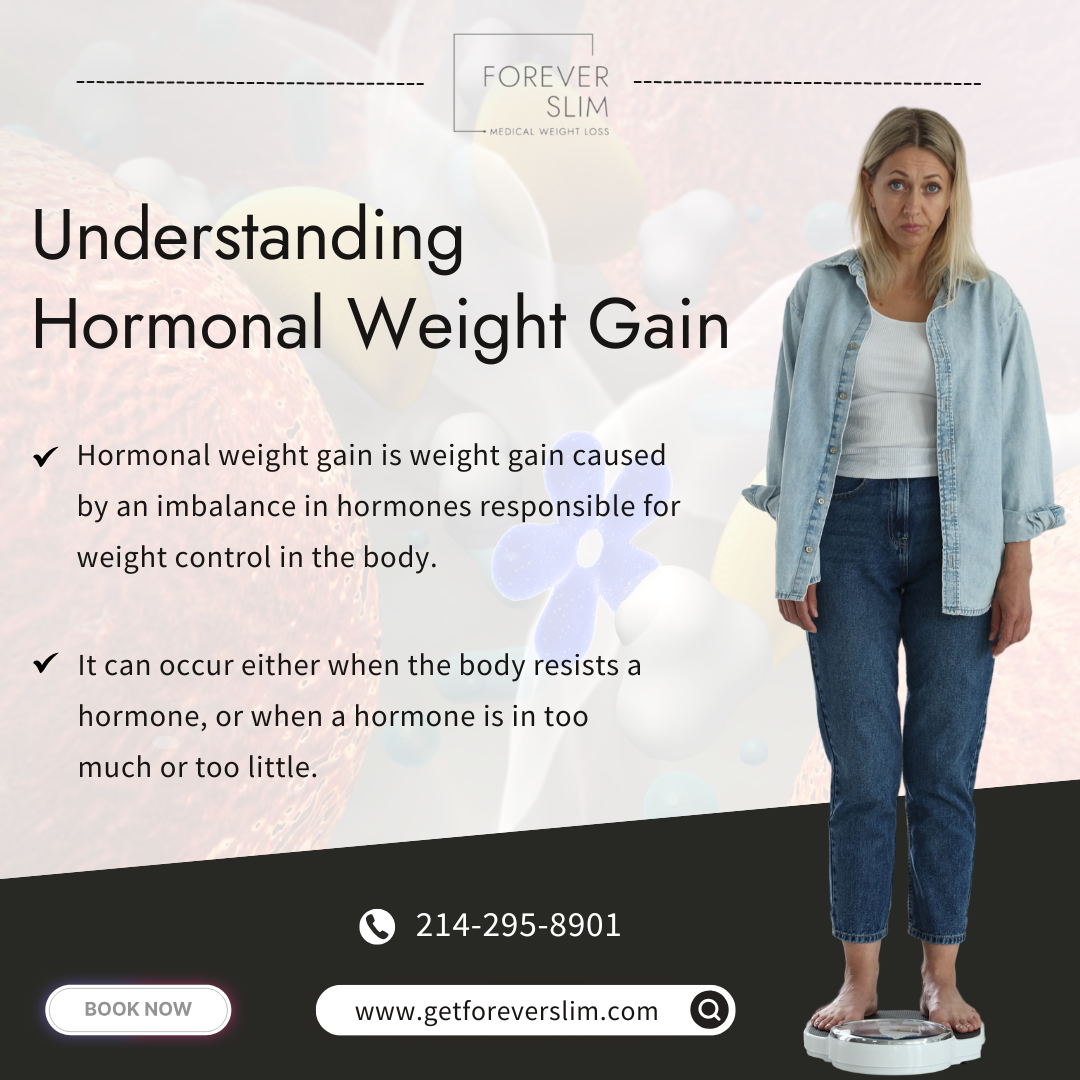
Medical Weight Loss in Little Elm, TX
Hormonal weight gain occurs when hormonal imbalances disrupt the body’s natural weight regulation processes. This can result in increased hunger, fat storage, and weight gain. Common hormonal contributors to weight gain include insulin resistance, cortisol imbalance, leptin resistance and many others.
These hormonal contributors are influenced by genetic factors and various environmental factors. Addressing hormonal imbalances is crucial for achieving and maintaining a healthy weight. In this article, we will be exploring the relationship between hormonal weight gain and medical weight loss in Little Elm, TX.
Understanding Hormonal Weight Gain
Hormonal weight gain is weight gain caused by an imbalance in hormones responsible for weight control in the body. It can occur either when the body resists a hormone, or when a hormone is in too much or too little. The common hormonal imbalances that result in weight gain include insulin resistance, cortisol imbalance, thyroid hormone imbalance, leptin resistance, estrogen dominance.

Each of these hormonal imbalances either affects metabolism, appetite, or fat storage.
Hypothyroidism slows down metabolism, leading to weight gain while high insulin levels lead to poor glucose uptake and increase glucose storage as fat. Chronically elevated cortisol levels can slow down metabolism, leading to weight gain, especially in the stomach. When leptin levels are high, the body becomes resistant, leading to increased hunger and appetite.
Excess estrogen can lead to increased fat storage, especially in the hips, thighs, and buttocks. These hormonal imbalances have a huge impact on metabolism, appetite, and fat storage, leading to weight gain and obesity.
Causes of Hormonal Weight Gain
Hormonal weight gain can be caused by certain factors which include:
- Genetics: Genetic predisposition is one of the most important contributing factors to hormonal weight gain. Genetics plays a significant role in hormone regulation. Hence, some individuals are more predisposed to weight gain than others.
- Medical Conditions: Medical conditions like Polycystic Ovary Syndrome (PCOS) are characterized by hormonal imbalances, resulting in insulin resistance, weight gain, and other metabolic problems.
- Menopause: Hormonal changes during menopause can result in weight gain.
- Sleep Deprivation: Poor sleep quality and duration can disrupt hormonal regulation in the body, resulting in weight gain.
- Stress: Chronic stress can lead to cortisol imbalance which may cause weight gain.
- Medications: Certain medications, such as steroids and hormonal birth control, can cause hormonal imbalances, leading to weight gain.
- Poor Diet: Diets high in processed foods, sugar, and unhealthy fats can disrupt hormonal balance and lead to weight gain.
- Lack of Exercise: Sedentary lifestyle contributes majorly to hormonal imbalances as well as weight gain.
Hormonal Weight Gain and Medical Weight Loss
Hormonal weight gain occurs when hormonal imbalances result in increased fat storage, and weight gain. Similar to other forms of weight gain, weight gain can be managed with various weight loss options. One of which is the Medical weight loss management in Little Elm, TX.
Medical weight loss programs are aimed at helping individuals with weight gain achieve and maintain a healthy weight. Medical weight loss is a detailed and personalized weight loss solution tailored to address specific hormonal imbalances and weight loss goals.
The treatment process begins with identifying the underlying hormonal imbalances. Then, a treatment plan that includes prescription medications, supplements, dietary changes and lifestyle modifications is created to help an individual achieve optimal weight loss. Medical weight loss in Little Elm focuses on long-term weight loss and this helps to achieve sustainable results.
It also addresses underlying hormonal imbalances to improve the overall health of an individual as well as reduce the risk of chronic diseases.
Medical Weight Loss Options for Hormonal Weight Gain
Medical weight loss treatments can be an effective way to achieve and maintain weight loss in Little Elm, TX. There are different types of medical weight loss treatments for individuals experiencing weight gain. These include:
Prescription Weight-Loss Medications
These are medications approved by the FDA to help with weight loss. Examples are:
- Bupropion-naltrexone (Contrave): A combination medication that helps reduce hunger and increase feelings of fullness.
- Liraglutide (Saxenda): An injectable medication that helps reduce hunger and increase feelings of fullness.
- Orlistat (Xenical, Alli): A weight loss medication that works by reducing fat absorption in the gut.
- Phentermine-topiramate (Qsymia): A combination medication that helps reduce hunger and increase feelings of fullness.
- Semaglutide (Wegovy): An injectable medication that helps promote weight loss by reducing hunger and increasing feelings of fullness.
- Insulin Sensitivity Medications: Medications like metformin can help improve insulin sensitivity, reduce insulin resistance and encourage weight loss.
Medical Weight Loss Programs in Little Elm, TX
These are specialized programs customized to help an individual achieve healthy body weight. These programs typically involve a combination of multiple approaches to promote weight loss in the body. Medical weight loss programs combined healthy diet, exercise, and behavioral counseling, as well as prescription medications in some cases.
You can consult with us at Get Forever Slim in Little Elm for a personalized medical weight loss program in Little Elm, TX.
Hormone-Based Medical Weight Loss Treatments
These hormone-based treatments may be used alone or in combination with other medical weight loss therapies such as diet and exercise counseling, behavioral therapy, and other medications.

The major HRT done for weight gain includes:
Thyroid Hormone Replacement
This is particularly for individuals with hypothyroidism. Thyroid hormone replacement therapy can help regulate metabolism and support weight loss.
HCG (Human Chorionic Gonadotropin) Injections
HCG is a hormone that helps with regulating metabolism, suppressing appetite, and increasing fat burning. If your hormonal imbalance is assessed, and HCG is exactly what your body needs to promote weight loss, then HCG replacement therapy is recommended for you.
Hormone Pellet Therapy
Bioidentical hormone replacement therapy (BHRT) can be performed using hormone pellets and this tackles the underlying hormonal imbalances causing weight gain. The most ideal form of HRT for medical weight loss in Little Elm differs for each individual, so there’s a need for consultation with a professional.
Lifestyle Changes for Medical Weight Loss
The major lifestyle changes to incorporate into your medical weight loss programs include:
Dietary changes
Dietary changes are essential to achieve your desired weight loss results. Eat lots and variety of fruits, vegetables, opt for whole grains and foods high in protein as well as healthy fats. Your dietary plan for weight loss should exclude certain foods like refined carbohydrates like cookies, cakes, pies and beverages with added sugar, such as sodas, fruit drinks and sweetened tea.
Exercise recommendations
Experts recommend an individual get at least 150 minutes of moderate exercise per week. Engage in moderate intensity activities that make your heart beat faster. If you’re new to exercise, you can ask your provider for guidelines about starting exercise and best recommendations.
Stress management techniques
Managing stress can help a person with weight gain. Some effective stress management techniques include deep breathing exercises, yoga, walking, mindful meditation, listening to music and many others.
Frequently Asked Questions
What are the hormones that activate weight loss?
The hormones leptin and insulin, and growth hormones have a major influence on our appetite, metabolism and body fat distribution.
Can hormonal imbalance cause weight loss?
Hormonal imbalance can cause weight loss just as it could cause weight gain. If you’re experiencing rapid weight loss, you may need to check your hormones.
How do you lose weight after hormonal weight gain?
To lose weight after hormonal weight gain, you need to balance your hormones, focus on maintaining a healthy diet, regular exercise, and efficient stress management.
How do I know if my weight gain is hormonal?
The major telltale signs of weight gain include fatigue, central obesity, acne, hirsutism, goitre, and purple striae.
What is the most successful medication for weight loss in Little Elm, TX?
The most effective weight loss medication is GLP-1 agonists, Current GLP-1 agonists approved for weight loss include Wegovy, Zepbound and Saxenda. They promote rapid weight loss when combined with lifestyle modifications.
Which hormone is responsible for weight gain in females?
The major hormone responsible for weight gain in females includes estrogen and thyroid hormone. Estrogen promotes the storage of fat for healthy reproductive years that lead to weight gain. Thyroid hormone affects the body’s metabolic processes.
Why am I gaining weight so fast all of a sudden?
Gaining weight rapidly can be due to anxiety, depression, insomnia, certain medications, and hormonal disorders like polycystic ovary syndrome (PCOS).
Get Forever Slim: The Best Weight loss clinic in Little Elm, TX for Medical Weight Loss.
If you think you’re experiencing hormonal weight gain, then it’s time for you to consult with our expert weight loss professionals at Get Forever Slim weight loss clinic in Little Elm, TX. We can help you identify the underlying cause and address the hormonal imbalances you’re experiencing to help you achieve your desired weight loss results.

Schedule an appointment with us at Get Forever Slim for a personalized medical weight loss program in Little Elm, TX.




